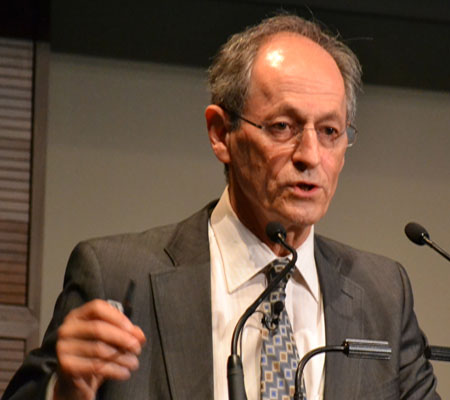
The growing gap in health between rich and poor in Canada and around the world is a “public health emergency,” warned global health equity expert Sir Michael Marmot in a major address in Toronto on May 29. Sir Michael was head of the World Health Organization’s Commission on the Social Determinants of Health and was introduced by Toronto Medical Officer of Health Dr. David McKeown as a “heath equity rockstar.” Sir Michael was invited to deliver the keynote at Toronto Public Health’s annual lecture named for the city’s pioneering Medical Officer of Health, Dr. Charles Hastings, who led many public health advances – from affordable housing to pasteurization of milk – in Toronto in the years before and after the First World War.
“Health is a measure of how well we are doing as a society,” said Sir Michael. On that measure, Canada – along with most other rich nations – has a decidedly mixed record. While on average, Canadians are healthier today than they were a generation ago, beyond the averages are a steep health gradient that reveals that the wealthiest Canadians are the healthiest, with each income quintile below suffering worst health outcomes and a heavier burden of premature mortality.
He used evidence from Glasgow in Scotland to demonstrate that men in the richest neighbourhood live, on average, to the age of 82 while men in the poorest neighbourhood have an average life of only 54 years. Globally, the health equality gap between rich and poor countries is even more dramatic, with men in Iceland living to an average of 80 years, while those in Sierra Leone live to a mere 37 years. But it’s not just the difference between the richest and the poorest, but rather the gradient that exists at every level in the income spectrum. For example, those in the middle class have worse health than those from the upper class with the poorest fifth of Canadians having the worst health of us all.
The problem is not that poor people in rich countries, or, indeed, poor people in poor countries, are biologically inferior to wealthier people, says Sir Michael. The culprit is what he calls a “toxic combination” of social and economic policies that linked, including education, income and labour markets, housing, food and social inclusion.
The ability of people to gain some measure of control over their lives has a direct bearing on their health, according to Sir Michael. He was the lead in the Whitehall study of UK civil servants that demonstrated that lower paid civil servants, who also had less control over their work lives, suffered worst health outcomes than higher status civil servants who had more control over their work lives. The White Hall study is recognized as a hallmark in health equity and health equality research. It turned on the head the previous assumption that high-level executives faced greater stress, therefore bigger health challenges.
In his Toronto presentation, Sir Michael cited research evidence from British Columbia that examines the suicide rate among Aboriginal youth in First Nations communities. Using a set of indicators to measure the ability of Aboriginal people to control key elements in their community (ranging from policing to land claims settlements), the BC research demonstrated that there was a much higher suicide rate in Aboriginal communities with low levels of community control.
Sir Michael warned that the health equality gap, which is already wide, threatens to grow even worse due to deliberate “austerity” policies by governments around the world. He noted that governments which cut the tax rates for the wealthiest people while also cutting income benefits for the poorest are practicing a “grotesque parody of fairness.” He urged policy makers to “create the conditions for people to take control of their lives” and called himself an optimist who believes that the world can achieve health equity within our generation.
If you missed the lecture, watch the video!
Closing the Gap: Building a healthier and more vibrant Toronto – 2012 Charles Hasting Lecture on Public Health from MaRS Discovery District on Vimeo.
Links and Resources:
The Wellesley Institute’s health equity portal – links to multiple resources
Sir Michael Marmot’s home page at University College London (with links to publications and other resources)
Final report of the WHO Social Determinants of Health Task Force
Toronto Public Health’s Unequal City report on health and income inequality
The Wellesley Institute’s Street Health report on health status of homeless Torontonians
The Wellesley Institute’s Poverty is Making Us Sick report on health and income inequality
The Wellesley Institute’s Sick and Tired report on health status of poor Ontarians
MAGIC – Measuring and Managing Access Gaps In Care
Prof David Hulchanski’s Three Cities report on income inequality in Toronto
The Equality Trust – UK website dedicated to income inequality
Canadian Index of Well-being – measuring what matters to Canadians